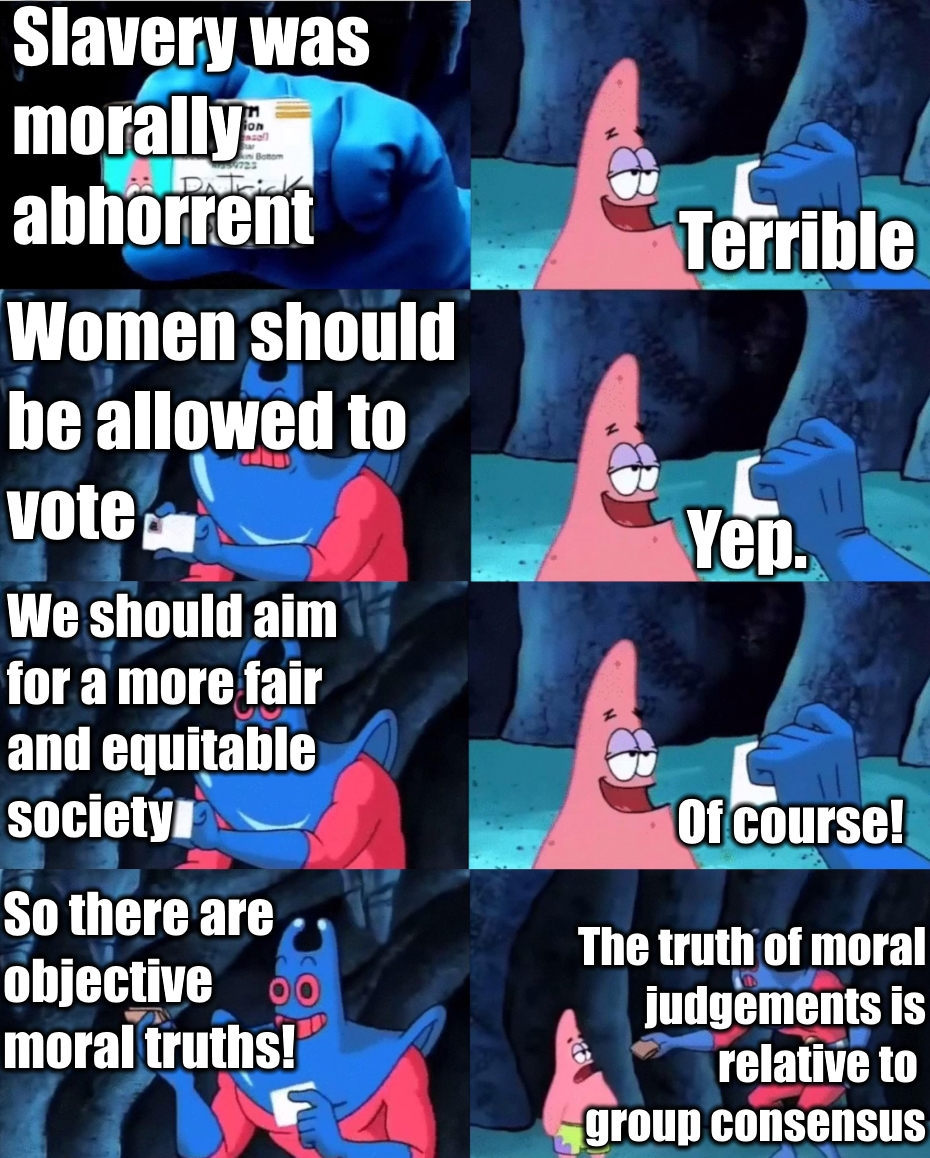Philosophy meme
Philosophy meme


Not sure why this got removed from 196lemmy..blahaj.zone but it would be real nice if moderation on Lemmy gave you some sort of notification of what you did wrong. Like an automatic DM or something
Philosophy meme


Not sure why this got removed from 196lemmy..blahaj.zone but it would be real nice if moderation on Lemmy gave you some sort of notification of what you did wrong. Like an automatic DM or something
You're viewing a single thread.
An Aztec would not agree to any of that. They took slaves, they didn't allow women to vote because they didn't allow voting and women were second-class and they weren't interested in a fair and equitable society, which is part of the reason their enemies helped the Spanish take them down.
So I'd say that your 'objective truths' didn't apply to a major human civilization.
Here is an adjacent argument to the one you gave:
Therefore, there is no "objective truth" to whether the election was fair or fixed.
Moral of the story, disagreement alone does not entail a lack of objective truth. But the post was not about moral disagreement, it was about moral progress.
Moral relativists have a hard time explaining why we should have moral progress. The moral relativist will argue that any action whatsoever will be a good action if there is a certain group consensus. So why should we fight for a more fair and equitable society if the society we have now is *exactly * as morally good as any other system we could enact? Even worse, if the majority of people in your situation believe that something unjust is the right thing to do, then protesting against them is morally wrong.
What does that have to do with my argument about the Aztecs? I don't see the connection.
Because you seem to misunderstand what objective means, the other user is attempting to help you understand that with an unrelated example.
Objective means something is true. It does not mean consensus.
What would it mean for a moral to be true?
Like we can prove the earth goes around the sun but how would you prove a moral value to be true?
Yes, I know what objective means. What makes their morals untrue and yours true?
That's the next step. Once we agree that someone is right and someone is wrong, then we can start talking about the definition of "moral good". And that is a very difficult and complicated discussion. But just because it's hard to define doesn't necessarily mean it's not real.
We don't agree.
You could for example take an utilitarian approach and then the objectively better decision would be the decision that leads to less suffering in total.
Simply because it is practically impossible for us humans to calculate the "total of suffering", doesn't mean this total does not exist. It objectively does exist for every given decision. Perhaps there are exceptions where there is equal suffering for all decisions. But that still wouldn't make it a subjective observation.
Arguably, the Aztec had an even bigger lack of information. For example by assuming that human sacrifices are a necessity. Or that women don't suffer when they are treated as lesser.
Suffering is an objectively "real" thing in our universe. Unless you also want to debate whether pain or the human existence is real.
This seems like an axiom of ethics: less suffering is good. Because why would more suffering be good?
This seems like it leaves us with the option to either decide actively against what is good, or make decisions randomly. Random would be if you don't consider whether a decision increases or decreases suffering / well-being. I am a total lay person for philosophy but this almost makes it seem like it's a logical fallacy to assume ethics (on a base level) are subjective. We must assume something to make a decision. And your decision always leads to an increase or decrease in suffering. Therefore all decisions are on an objective scale of mortality..?
What is worse, blowing someone up on a battlefield or capturing them and sacrificing them later? I'd say the latter because the death is relatively quick and painless and included a soporific to calm the victim down. The latter was what the Aztecs did. Their wars were for capturing prisoners, not killing enemies. I don't know... that sounds like their sacrifices are more moral than blowing someone's legs off and letting them bleed out. I'd call the latter a lot more moral than the former. Because less suffering is good, right?
This is a very superficial view on the matter. You would have to consider all factors.
Which practices lead to more trauma? To more future victims? What are the long-term consequences for the future? Does one decision lead to more suffering in humans 3000 years in the future for some reason? Etc. Objectively, one way is the better one. We just don't know which one it is.
Wait, now we don't know what is objectively morally true?
I would say we can't in most cases know exactly or even approximately what is the objectively morally better decision. But that doesn't make it less objective. It just makes it hard or perhaps even impossible to know.
How can you know it's objective if it's impossible to know what is morally better?
Whether or not an election has been fair has criteria that can be objectively evaluated. With "moral goodness", those criteria do not exist.
A moral relativist does not have explain why moral progress is good, because they disagree that you can even really define moral "progress". At best, there is moral change, and society always catching up to whatever that change may have been. Mortality is an inherently subjective concept, and therefore what is considered morally good can change, or rather: the 'moral goodness' of something changes over time. Someone in the past may have fully believed their actions were morally just, despite us viewing them as monsters now. And perhaps things we now consider to be morally just will be considered morally reprehensible in 50 years from now.